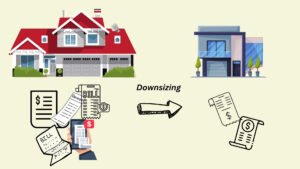Do you ever walk through your home and realize some rooms haven’t been used in months? The kids have flown the coop, the echoes in the hallway are a little louder, and suddenly, the family home feels… a little too big? For many, the idea of downsizing can feel like an emotional step backward, a letting go of a home filled with a lifetime of memories.
But what if we told you it’s actually one of the smartest financial leaps forward you can make for your retirement? What if selling that big house could fund your travel dreams, eliminate financial stress, and simplify your life in ways you never imagined?
Beyond just a smaller mortgage, there are some truly surprising financial perks hiding in the decision to downsize. We’ve uncovered 5 key benefits that can significantly boost your retirement savings and upgrade your quality of life. Ready to discover how a smaller home can lead to a bigger, more secure retirement fund? Let’s dive in.

In This Guide, You’ll Discover:
- The Immediate Windfall: Unlocking Decades of Home Equity
- The ‘Stealth Savings’ of Slashing Hidden Housing Costs
- The Clutter Cash-In: Turning a Lifetime of ‘Stuff’ into Savings
- The Lifestyle Dividend: How Simplicity Saves You Money
- The Unexpected Income: Leveraging Your New Space
- Navigating the Emotional Side of Downsizing
1. The Immediate Windfall: Unlocking Decades of Home Equity
This is the most significant benefit, and it’s worth understanding clearly. For most homeowners, their largest asset isn’t in a bank account; it’s the very walls around them. It’s “paper wealth.” Downsizing is the process of turning that paper into real, spendable cash that can fund your retirement dreams.
Think of it this way: selling your larger home and buying a smaller, less expensive one can instantly unlock a substantial sum of money. This new capital can be a game-changer: invest it to generate a steady income stream, pay off any remaining debts for good, or simply create a robust emergency fund that lets you sleep soundly at night. To understand your potential, it’s wise to learn about the different ways you can use your home equity to your advantage in retirement.
Your Action Plan:
- Get a Professional Valuation: Contact a local real estate agent for a professional appraisal of your current home’s value. Don’t rely on online estimates alone.
- Do the Math: Use this simple formula: (Your Home’s Sale Price) – (Remaining Mortgage + Closing Costs) – (New, Smaller Home’s Price) = Your Downsizing Windfall.
2. The ‘Stealth Savings’ of Slashing Hidden Housing Costs
The savings from downsizing go far beyond a smaller mortgage payment. Many retirees are shocked by how much the “hidden” costs of running a large home were quietly draining their accounts. These are the expenses you pay year after year that add up to thousands. Take out your last year of utility bills and your annual statements for property taxes and homeowner’s insurance. Now, imagine cutting that total number by 30-50%. That’s a realistic goal with downsizing.
- Lower Utility Bills: It costs significantly less to heat, cool, and power a smaller, often more modern and energy-efficient space. Think smaller rooms, newer windows, and better insulation.
- Reduced Property Taxes & Insurance: These essential costs are almost always tied to the value and square footage of your home. A smaller, less valuable home directly translates to a smaller bill from the city and your insurance company, year after year.
- Minimal Maintenance: Say goodbye to weekend-long yard work! A smaller property drastically reduces recurring headaches and expenses like lawn care, pool maintenance, thousand-dollar roof repairs, and pest control. This doesn’t just save money; it saves your precious time.

3. The Clutter Cash-In: Turning a Lifetime of ‘Stuff’ into Savings
Moving to a smaller space provides the perfect motivation to finally tackle decades of accumulated possessions. While this process can be emotional, think of it as a treasure hunt through your own life. You’ll be amazed at what has value. That old furniture in the guest room, the unused exercise equipment, the formal dinnerware gathering dust—they can all find a new home and put extra cash in your pocket.
Your Action Plan:
- Adopt the 4-Box Method: Tackle one room at a time with four boxes: Keep, Sell, Donate, and Toss. Be honest with yourself about what you truly need and use.
- Sell Strategically: Use platforms like Facebook Marketplace or eBay for common items, but consider local consignment stores for high-quality furniture or antiques. For a hands-off approach, an estate sale company can manage the entire process for you. Always follow official guidance on selling your items safely online.
4. The Lifestyle Dividend: How Simplicity Saves You Money
This benefit is subtle but powerful. A larger home often comes with unspoken pressure—more rooms to furnish, a larger yard to landscape, more space to clean, and more “stuff” to fill it with. This can lead to a cycle of unconscious spending to maintain a certain image or simply manage the property.
Downsizing naturally breaks this cycle. It encourages a more intentional lifestyle where you value experiences over possessions. With less time and money spent on home upkeep, you free up those resources for what truly brings you joy, whether that’s traveling, learning a new skill, or simply having more quality time with grandchildren. The “less house, more life” philosophy often leads to significant, effortless savings.
5. The Unexpected Income: Leveraging Your New Space
Downsizing doesn’t just save you money; it can also become a new source of income. Many people downsize from a four-bedroom house to a two-bedroom condo or townhouse. That spare room, no longer needed for kids, can be a fantastic financial asset.
Your Action Plan:
- Consider a Housemate or Tenant: Renting out a spare room can provide steady, reliable monthly income to supplement your retirement funds.
- Explore Short-Term Rentals: If you prefer flexibility, platforms like Airbnb allow you to rent out your spare room to travelers when it’s convenient for you.
- Create a Workspace: Use the extra room as a dedicated home office for remote work, consulting, or turning a hobby into a small business. Before you proceed, always check local zoning laws and understand your tax obligations on any rental income.

Navigating the Emotional Side of Downsizing
While the financial benefits are clear, the emotional journey is just as real. It’s okay to feel sad about leaving a home filled with memories. Here are a few ways to honor the past while embracing the future:
- Acknowledge the Feelings: Give yourself permission to be nostalgic or even grieve the end of an era. It’s a natural part of the process.
- Focus on What You’re Gaining: Instead of focusing on the “less house,” focus on the “more life”—more freedom, more travel, less stress, more financial security.
- Digitize Your Memories: You can’t take every drawing your child made, but you can scan them. Digitize old photos and home videos to preserve the memories without taking up physical space.
Downsizing is Upgrading Your Retirement
Ultimately, downsizing is not about giving things up. It’s about making a smart, strategic choice to upgrade your retirement. By converting a high-maintenance house into flexible cash and a low-maintenance lifestyle, you are freeing up your two most valuable assets: your money and your time. You are giving yourself the gift of a richer, more secure, and more enjoyable future, with fewer worries and more opportunities for joy.
* You Might Also Like – A Simple Budget for Seniors on a Fixed Income
